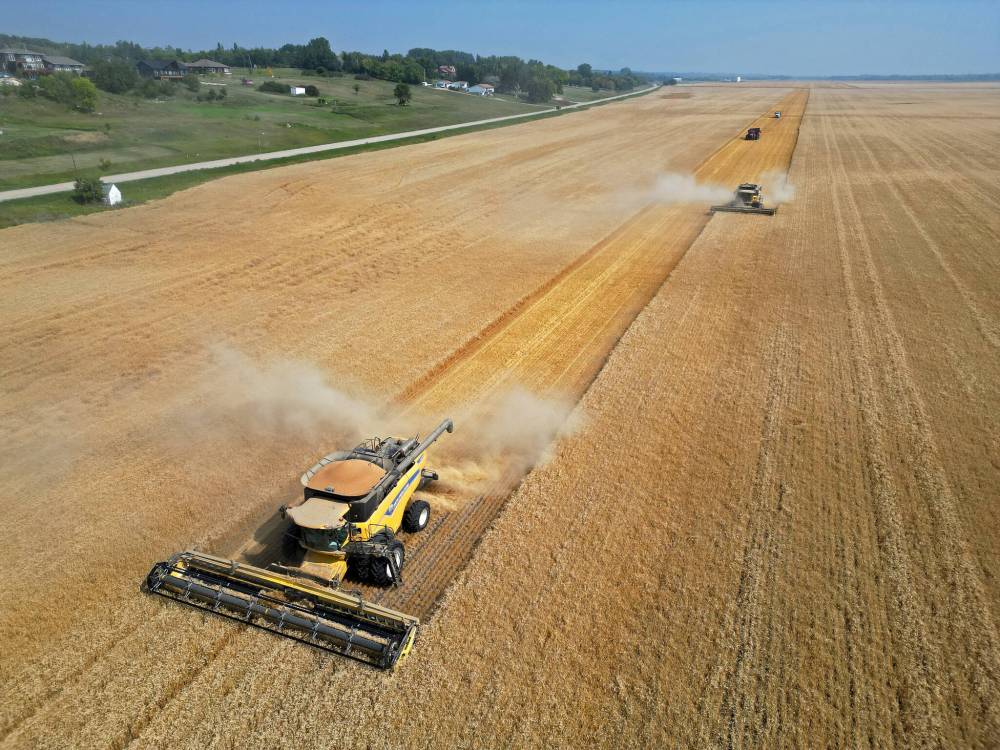
The Manitoba agricultural industry is bracing for the worst as the country’s two main railways and their workers face a work stoppage standoff set for Aug. 22.
For both the farmers and the grain companies, it really couldn’t happen at a worse time.
With Teamsters having taken a strike vote and both Canadian National Railway Co. and Canadian Pacific Kansas City Ltd. saying they will lock workers out on Aug. 22, both sides have 10 days to resolve the matter.

TIM SMITH / THE BRANDON SUN FILES
Agriculture and agri-food exports from Manitoba generated $9.39 billion in sales in 2023.
But with producers getting their combines and machinery ready for harvest — starting with barley and peas — things do not look promising.
Wade Sobkowich, executive director of Western Grain Elevators Association (WGEA), said it’s not a good sign that both sides are preparing for a work stoppage.
“That leads us to believe that things aren’t really going that well if there is the threat of a lockout and the threat of a strike.” he said. “On balance it is probably more likely there will be a strike or lockout than not.”
The WGEA’s members, including Richardson International, Cargill Limited, Parrish & Heimbecker, handle about 90 of the country’s bulk grain exports.
Both the WGEA and organizations like Keystone Agricultural Producers (KAP), which represents farmers and producer organizations, say that there’s not much more they can do except try to get the word out about how damaging such a disruption could be.
“We need immediate action as far as them sitting down and getting this settled,” said Jill Verwey, the president of KAP. “It’s definitely something that will be felt in producers pocket-book and it has a negative impact on us as a nation.”
Agriculture and agri-food exports from Manitoba generated $9.39 billion in sales in 2023, representing 44 per cent of the province’s exports.
The fact that the two railways are really the only way for producers to get their product to market has been an ongoing worry for the industry for a long time because when there is a service disruption regardless of the reasons, there are no options for shippers.
“We’re trying to emphasize to producers to reach out to their MPs to reinforce to them the importance of this,” said Verwey. “We’re stressing that this is not only hurting us as producers but it could have a devastating effect on our reputation as an exporter of grain internationally.”
When there is uncertainty regarding the virtual monopoly on the shipment of grain it ripples all the way through the supply chain.
“It doesn’t matter if it’s poor rail service or a work stoppage,” said Sobkowich. “It’s the same phenomenon. There is no Plan B. All you can do is start winding down your operation.”
That means making sure everything that is in transit is something that could get on a vessel before the work stoppage and to try to halt deliveries to country elevators — which are about 45 per cent full right now — so it doesn’t plug up the system
“You look for any opportunity to defer a sale and push it out to a future time period,” he said. “There are some things that could be done to mitigate damage and reduce costs, but that’s it.”
JESSICA LEE / FREE PRESS FILES
Jill Verwey, vice-president of Keystone Agricultural Producers on August 31, 2021 at the Legislative Building in Winnipeg.
After Canadian National Railway Co. and Canadian Pacific Kansas City Ltd. warned on Friday they will lock out employees on Aug. 22 unless they can reach deals with their employees, the threat of a work stoppage that could snarl supply chains countrywide was ramped up.
The Teamsters Canada Rail Conference (TCRC), which represents some 9,300 engineers, conductors, yard workers and rail traffic controllers, claimed that CPKC wants to “gut the collective agreement of all safety-critical fatigue provisions.”
CN has targeted fewer points linked to fatigue, the Teamsters said, but has also proposed what the union called a “forced relocation scheme” that would see some employees move to far-flung locations for several months at a time to fill labour gaps.
“From the very beginning, railworkers have only ever sought a fair and equitable agreement. Unfortunately, both rail companies are demanding concessions that could tear families apart or jeopardize rail safety,” said Teamsters president Paul Boucher in a statement Friday.
The railways have put forward two different sets of offers each, stating that they all comply with safety rules — a point the union has not denied.
One CN proposal would see employees on a scheduled 40-hour work week, with at least 10 or 12 hours of rest between shifts — depending on whether they’re at home or away — and either two or three consecutive days off each week, in compliance with the law.
The scheduled approach to shifts — a comparable offer was tabled by CPKC before being withdrawn “conditionally” on Friday — would mark a drastic change from the mileage-based system of pay that has been in place for decades at both companies.
— with files from The Canadian Press

Martin Cash
Reporter
Martin Cash is a business reporter/columnist who’s been on that beat for the Free Press since 1989. He’s a graduate of the University of Toronto and studied journalism at Ryerson (now Toronto Metropolitan University). Read more about Martin.
Every piece of reporting Martin produces is reviewed by an editing team before it is posted online or published in print — part of the Free Press‘s tradition, since 1872, of producing reliable independent journalism. Read more about Free Press’s history and mandate, and learn how our newsroom operates.
Our newsroom depends on a growing audience of readers to power our journalism. If you are not a paid reader, please consider becoming a subscriber.
Our newsroom depends on its audience of readers to power our journalism. Thank you for your support.


